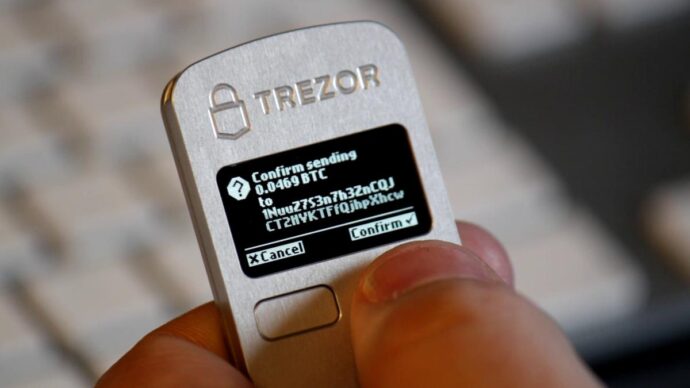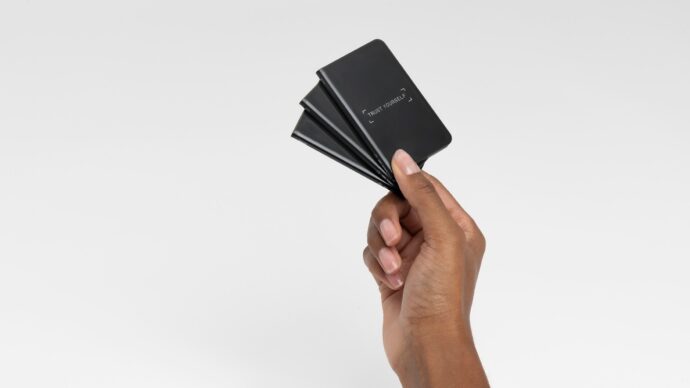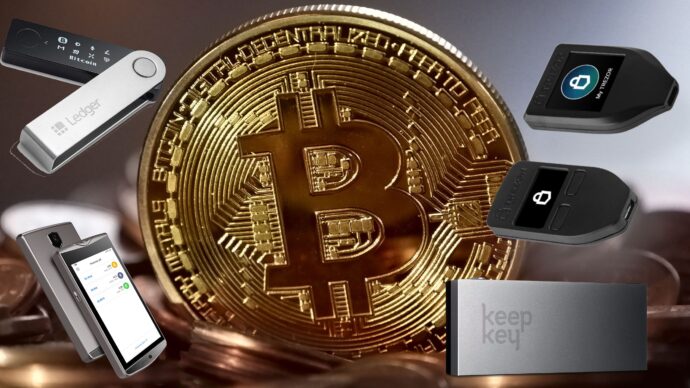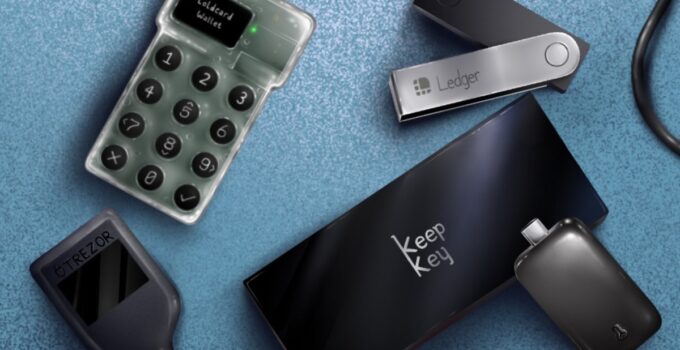Self-custody allows you to manage your own Bitcoin with the help of a trusted wallet, removing it entirely from the exchange so that you can enjoy financial freedom. You and only you have access to the funds. Having your own keys comes with tremendous responsibility, which implies that you must keep them safe and secure. If you lose access to your Bitcoin account, your cryptocurrency will be lost forever.
A physical device that stores the private keys offline, like a flash drive, can provide peace of mind, not to mention protection against loss and theft, so it’s a good investment. You should only buy it directly from the manufacturer to eliminate the risk of the device being tampered with.
Ahead, we’ll explain in detail what a hardware wallet is, the advantages it provides, and how to use one.
What Is a Bitcoin Hardware Wallet?

Source: thehindu.com
Cryptocurrency wallets fall into two categories: hot and cold. Hot wallets always remain connected to the blockchain network and the Internet, while cold wallets are offline and take the shape of a small, portable device (e.g., a USB stick).
Generally speaking, a plugin device is considered a more secure storage option because it’s not connected to the Internet, so it’s not vulnerable to hacking attempts and other cyber threats. A Bitcoin hard wallet isn’t connected to the Internet, not counting when you must complete a transaction. Besides Bitcoin, Ethereum, stablecoins like Tether, and other popular digital assets are supported.
It’s easier now than it’s ever been to buy Bitcoin with credit card, but knowing how to store the cryptocurrency suitably and reliably requires a lot of work. A hardware wallet doesn’t store your Bitcoin. As mentioned earlier, it stores your private keys that allow you to send and receive Bitcoin, meaning that it eliminates the third party between you and your cryptocurrency.
When you use a physical medium to sign a Bitcoin transaction, it uses your private keys to confirm the transaction, guarding against prying eyes. The physical device is locked with your PIN code, which is known only to you. Even if the Bitcoin wallet falls into the wrong hands, that person won’t be able to access your data or your funds.
Is A Bitcoin Hardware Wallet a Good Idea?

Source: dezeen.com
Protection is important in the ever-changing world of cryptocurrency. Transactions require protection against interception and manipulation. The most effective strategy you can use to protect your holdings is to use a hardware wallet, as it allows you full control over your Bitcoin. If used correctly, it’s impossible to hack.
The key vault is stored in a separate memory bank, so in the event that an attacker infects your PC with malware, they won’t be able to get access to your Bitcoin. It’s recommended to use physical technology if you place a strong value on security or have many Bitcoins to protect.
Since the private keys are kept offline at all times and never fall into the wrong hands, a hardware wallet is hack-proof. The only drawback is that it’s harder to access your holdings if you want to spend your Bitcoin, and it requires discipline.
A device like a USB drive provides trust, reliability, and uncompromising security, facilitating secure transactions and simplifying the management of multiple cryptocurrencies. Due to encryption, hardware components, offline storage, and two-factor authentication, a hardware wallet is worth the investment. The only risk to using one is physical theft.
What Are the Best Practices When Using a Bitcoin Hardware Wallet?

Source: bdtechtalks.com
Take into account the manufacturer’s specifications when setting up the Bitcoin hardware wallet. Visit the manufacturers’ official website and download and install the software on your computer or mobile device (phone or tablet). You can then generate a Bitcoin account and the private keys.
A recovery phrase allows you to access your funds regardless of what happens to the physical device, giving you access to the private keys stored on the device. It’s a list of 12 to 24 words that are generated when the account is first created. It’s a good idea to store the recovery phrase in multiple offline locations.
A hardware wallet is a cold wallet if you don’t use it to interact with smart contracts. Web3, which relies on self-executing contracts built on the blockchain, enables your Bitcoin wallet to interact with smart contracts, but you don’t know what you’re agreeing to.
More precisely, not all plugin devices display the details of the smart contracts, which leads to blind signing. The hardware can understand the basics of a smart contract, but it doesn’t display the information in a human-readable language, so you must trust the developer of the dApp you’re interacting with.
Despite the fact that a hardware wallet is one of the most secure ways to store your Bitcoin, your common sense can help avoid an unpleasant situation. For example, you should never send a high amount of cryptocurrency between accounts without checking the receiving address first.
Scammers hope you won’t double-check the details before sending funds. If you accidentally send Bitcoin to the wrong address, contact the receiver and request a refund. Transactions can’t be stopped or reversed because they’re irreversible.
Fire and water can damage the hardware piece of physical technology even if it features aluminum components, so it’s recommended to store the physical device in a safe. You must go the extra mile to keep the Bitcoin wallet safe and locked. It should get regular updates for bug fixes, security patches, and feature additions to ensure a seamless experience. Besides that, you only need to be mindful of the fees associated with cryptocurrency trading.
Wrapping It Up
Hot wallets are popular for storing Bitcoin, but they’re the least safe option because they’re susceptible to security breaches. Hot wallets are recommended only for short-term use, as they’re not dependable.
A cold wallet is of the essence because it reduces the risk of malicious actors stealing your funds, but it requires security measures to keep it from getting damaged, lost, or stolen. If you decide that a Bitcoin hardware wallet is the right choice for you, ensure it’s compatible with your device and operating system. Most importantly, don’t buy second-hand, as the device could have been tampered with.




